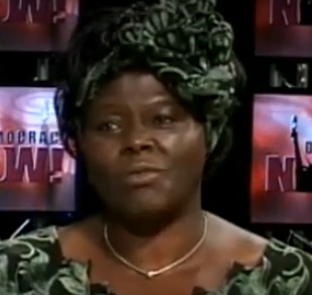In
this article from Truthout it describes the results of the COP17 talks as "an agreement to try to agree". Is this a worthwhile resolution in this time of climate crisis? As
Anjali Appudarai said they did not "get it done". Quite simply they didn't want to get it done, and it is important to understand why they didn't want to get it done.
In
this article by Naomi Klein we begin to see why there is no desire to get it done. Capitalism cannot continue to make its profits, and work towards climate change. Whilst there are many levels to the reasons why capitalism cannot continue it boils down to the notion that resources are finite and capitalism always needs to expand its profits. Recognising that resources are finite requires an ideological understanding that we have to live within the limits that nature gives us, and we have to use resources sustainably. This is fundamentally contrary to capitalism, and how the corporatocracy makes its profits. If they want to profit they create more money and more wars, at the same time the destruction of the environment does not matter to them - except in its ensuing limitation of profits.
Naomi begins her discussion on this by pointing out the absurdity of climate change "deniers". Originally climate denial was not fashionable even on the right, because the corporatocracy believed they could profit from green capitalism -
I too had hoped this. But now capitalism has decided that they cannot profit from climate, they have instructed their puppets to change tack and deny the existence of climate change, and they did all they could to prevent COP17 from making decisions.
What are the decisions that COP17 were looking to make? The small island states and Africa were saying that global warming is beginning to take affect now. These countries cannot wait until 2020 (or some other arbitrary date) for solutions to be implemented, they cannot wait until the majority of the US is suffering form climate change and their government needs to enact change in their own self-interest. Global warming is affecting these countries now. But it is not their emissions that are causing the problems, it is emissions from other countries such as the First World and China. These affected countries needed something to happen now, and it didn't. They wanted COP17 to "get it done" but the West didn't want to reduce their emissions so lessening their profits. And their brinkmanship doesn't need to at the moment so let the rest of the world suffer - even though they were not the cause of the problem.
Then there was the desire to create a fund for reparation. Historically the US Canada and Europe have contributed the most to the climate damage, COP17 was asking that these countries pay for that damage. They of course didn't want to accept responsibility. Not only this but they wanted to control this climate fund in much the same way they control the IMF and World Bank. The IMF and World Bank ostensibly loan money to struggling nations, but they apply conditions to these loans. This sounds reasonable until you start looking at the affects of these conditions. IMF and World Bank loans require the growing of cash crops that damage the environment, they require export to be a priority, and they require the sale of state assets - privatisation. All of these measures benefit the NATO countries. The third world resisted this for the climate fund so the West simply said we are not going to accept our historical responsibility for the climate problem. They are going to allow climate problems to decimate the countries so that the countries will be forced cap-in-hand to accept the conditionality imposed on them. This will lead to the loans being used to benefit the West whilst also taking debt repayments.
Here is how the
Green Belt Movement describes the existing measures for green relief using carbon trading and carbon offsets. I don't understand fully what is happening but there does seem a number of clear issues. To comply with financing regulations requires far too much of a financial outlay for grass roots organisations. Secondly regulations do not draw a distinction between indigenous trees that would promote ecological sustainability and fast-growing trees established as monocultures. Both of these drawbacks which for some might sound like nit-picking gear the carbon offset and carbon-trading regulations for the benefit of the profits of transnationals rather than for the benefit of the communities and the environment.
This is typical of 1% exploitation concerning the environment. Unleaded petrol was lauded for years in the UK as environmentally sound, but it was only introduced when the petrol companies could profit from it and tax breaks were introduced. Again detractors would argue that I am nit-picking because unleaded petrol was introduced, shouldn't I be grateful? Of course I am grateful but why wasn't it introduced earlier? Is the only way the world is going to work towards climate change when business can profit. Quite obviously that is the truth, and that is the path top environmental destruction. Capitalism and climate change cannot be partners as discussed above and in
Naomi Klein's article. Let's say it like it is, and begin to address that problem. Transnationals get in the way of climate change, and transnationals have installed puppet givernements in the West - as is the message of the 1%. By facing this reality we can begin to alter the democratic dialogue and possibly there will emerge politicians who genuinely seek change - as opposed to Obama, Wall Street's lobbyist general. Whilst the majority of climate-aware people hope that seeking partnership with business will produce results, transnationals will continue to manipulate that partnership thus enabling exploitation of ecology emissions such as the carbin offset and trading as described by the
Wangari Maathai & the GBM. Patching and compromise are misused and are not producing results, the situation is only worsening. COP17 is a cop-out, it is compromise and patching and that's why Anjali's Appudarai calls to "get it done" are falling on deaf ears. Far too many of the people who are delegates at this conference are making a comfortable living pretending to have an impact when in reality their compromise is being used by the 1% as a means of appeasement and control.
When I look back at teaching and think of all the effort I put in to fight the
prevailing paradigm, and then evaluate the results my life amounts to little. This is a reality climate apologists need to come to terms with now, confronting the puppets of the 1% in governments needs to be more than just Anjakli's prerogative of eloquent and vehement youth. It also needs to be more than just youth saying it, so that 1% media cannot dismiss such truth as a youthful phase to be "grown out of" or the blinkers of left-wing extremism. When
recent carbon figures show an increase of 5.9 % and "according to the New York Times it represented "almost certainly the largest absolute jump in any year since the Industrial Revolution"", COP17 is no different from the previous 16 and the process is relatively meaningless giving the appearance of doing something that mainstream media can pretend to report on as activity. Isn't it time to withdraw from this cover-up?
Isn't it time that intelligent people withdraw from a rat-race? Corporate life are making increased demands on the time of their employees. They become sucked into a race to be executives acceding to demands for more and more commitment to the office above and beyond their commitment to family. But not only this the demands turn these aspirees into complicit minions of the 1%. These minions show the same dispassionate exploitation of humanity that is shown by the CEO, and for what? A marginal increase in salary and a huge increase in hours and personal commitment. Is this right livelihood? We cannot choose everything that we do but if all people minimise the negative impact of our labour then gradually the exploitation of humanity and environment will lessen.
This is part of the dual job strategy I have
discussed here and
here. There is a need to work for income to live whilst at the same time providing a survival fallback platform. Commitment to the transnational can never benefit humanity, commitment to the school rather than education, commitment to the hospital rather than healing, make these our human priorities in the workplace. Education is not the corporate paradigm, healing is not servitude to the profits of Big Pharma and the cancer industry. And of course commitment to the hierarchy of a transnational benefits the 1% mostly, the compromised a little, and detracts greatly from humanity and the environment. When we begin to delineate in the workplace we begin to control change, but we do so at a cost to ourselves. We lose out on salary and career as others who compromise do the required dirty work, but the more such people who "collaborate" are seen in such a light the more there is the possibility of change. As with trade unionists we risk dismissal as the 1% recruit from the reserve army. But with integrity we have the personal tools to be able to cope. Recognising the possibility of financial hardship as a result of our integrity allows us to make plans, adjust our lifestyles and live sustainably, this living beyond the control of the 1%. In the 60s I grew up with this notion of integrity versus collaboration - seling out, sadly soon after the 60s the majority did in fact sell out leading to the wholasale collaboration of Thatcher's children. We now need to fight for a return to such integrity.
It is no point saying that the other has the luxury of principle, my family needs me to be a breadwinner. We all need integrity, we all need to apply principle when the school requires us to teach acceptance of compromise. Trade unions need to turn away from purely the struggle for an increased share of marginal costs into institutions of integrity fighting for the rights of members not to have to compromise their integrity. For trade unions simply to fight for increased wages in metropolitan countries is a complete collaboration with the 1%. Politicial strategies that compromise in order to promote the building of trade unions irrespective of integrity have proven not to work, and the independent power of trade unions has diminished as a result of this collaboration. As instiuttions trade unions are as much a part of the collaboration as are people selling out for a rung on the ladder. And how has this occurred? Because there are echelons within trade unions whose survival depends on salaries from the institutions, again collaboration for comfort. In terms of trade unions such views were always rejected as "Trot" and considered destructive for the movement. But at the time mobilisation of the movement was possibly an effective strategy against the bourgeoisie, it is now the time to recognise that such a strategy only fits into the corporatocratic paradigm leading us to the current situationof permanenty recession whilst our taxes become banksters' bonuses.
Climate justice starts with personal justice and personal integrity. Seeking such justice in the workplace whilst also working for consensus mobilisation such as Occupy whilst adopting a dual approach to our own survival might enable personal and human survival - if we stay outside sustainable spiritual communities. Along with Anjali we can then say
"get it done" with integrity.



